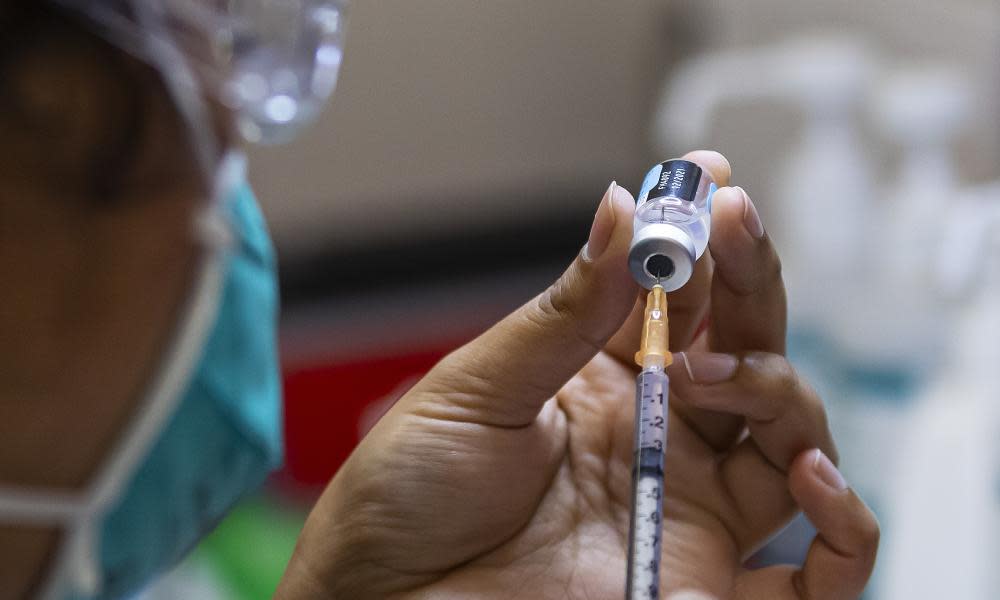Australia’s supply of Pfizer Covid vaccine may face disruption in October

Australia faces a possible Pfizer supply disruption next month, with states still in the dark about how many doses they will receive a week.
Federal authorities have been forced to use some of the 4m doses from a deal with the UK to smooth the possible supply interruption in early October.
The stopgap measure will ensure states and territories receive a total projected 9m doses of Pfizer in October, but could delay when Australia gets the full benefit of additional doses by a matter of weeks.
On Monday, the Victorian premier, Daniel Andrews, revealed the head of the national vaccine taskforce, Lt Gen John Frewen, had advised states of a “problem” with Pfizer supplies in October.
Pfizer is yet to advise the commonwealth of weekly figures of Covid-19 vaccine deliveries for October. States and territories are unaware how many doses they will be allocated beyond the second week of October – and don’t know whether the doses are coming direct from Pfizer or the UK deal.
The health department told Guardian Australia it is expecting a total of 11m mRNA vaccines to arrive in October, up from 10m in September. The October allocation includes 9m Pfizer doses, the bulk of the 4m doses from the UK and the rest from the company.
“No state or territory will receive less mRNA vaccines in October when compared to what they received in September,” the department said.
On Monday the health minister, Greg Hunt, said that “every state and territory is receiving their full allocations” because “the UK doses are arriving earlier, and that’s allowed us to manage just simply the issue of flight arrivals”.
Related: In hindsight there was no foresight: how Australia bungled its Pfizer Covid deal
“We’ve been able to ensure that our UK doses arrived earlier, and as a consequence of that, we have 1.9m doses of mRNA that are available for this week.
“Next week, there’s an increase in that, and the following week, we’ll also see well over 1.9m doses in the first week of October.”
Hunt’s figures indicate that despite the early arrival of doses from the UK, Pfizer doses are levelling off rather than ramping up as the states had expected.
According to the federal government’s vaccine horizons document, published in June, Australia was expecting between October and December it would receive between 1.7m and 2.3m Pfizer doses a week and 430,000 and 615,000 Moderna doses a week.
The document also “confirmed allocations will be provided four weeks in advance, once supply is confirmed with vaccine manufacturers”.
Since mid-August, Australia has signed dose-swap deals for 4m doses from the UK, 1m doses from Poland, and 500,000 doses from Singapore.
Pfizer is contracted to supply 40m doses in 2021, the bulk of which are arriving in the final quarter of the year.
A spokesperson for Pfizer Australia ruled out that there had been any slowing of Australia’s anticipated supply schedule as a result of the bilateral deals, but declined to say if October’s weekly figures had been supplied to the government, saying it was “commercial in confidence”.
“In the extraordinary circumstances of pandemic supply, we have to make room to adjust allocations based on overall demand around the world,” she said, but insisted the company is on track to supply the full 40m doses in 2021 and meet monthly targets.
The federal health department said that “every Australian over the age of 16, in every state and territory, will have the opportunity to be fully vaccinated by the end of October”.
The uncertainty about the schedule of weekly supplies in October comes at a precarious time for the states, with New South Wales set to pass through the 70% and 80% vaccination targets on 10 and 24 October and Victoria considering indicative dates of 26 October and 5 November.
The Australian Capital Territory chief minister, Andrew Barr, has warned based on figures provided by the commonwealth it is facing a 30,000-dose shortfall in September and October, missing out on a projected supply boost.
In Queensland, South Australia and Western Australia people aged over 60 are eligible for Pfizer, not just AstraZeneca as is the case in the other jurisdictions.
Eligibility for the vaccine program was only opened in mid September to those aged 12 to 15, who can take Pfizer or Moderna, and children aged 5 to 11 could be receiving vaccines by the year’s end, depending on regulatory approvals.

 Yahoo News
Yahoo News 
